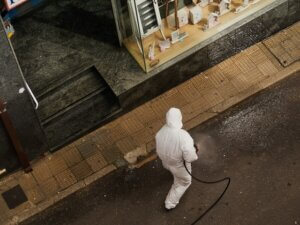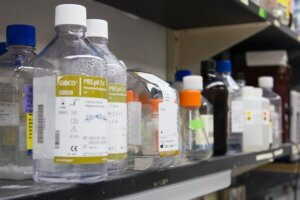The Hidden Dangers of Trauma Cleaning Services
The Hidden Dangers of Trauma Cleaning Services
Summary
Trauma cleaning services are indispensable for restoring spaces after traumatic events, but they come with hidden dangers that demand attention. From health hazards and biohazards to inadequate cleaning and cross-contamination, this article explores the complexities of trauma cleaning. Professionals equipped with expertise, proper equipment, and training can handle the psychological toll, legal compliance, and environmental impact with care and precision. By trusting certified trauma cleaning services, individuals can ensure their safety and focus on healing and recovery while sensitive scenes are restored with compassion and professionalism. For such needs, AllAces Cleaning & Restoration stands ready 24/7 with trained IICRC-certified technicians.
Trauma cleaning services play a vital role in restoring spaces after traumatic events such as accidents, crime scenes, or biohazardous incidents. While these services are essential for public safety and emotional support, it’s crucial to be aware of the hidden dangers associated with trauma cleaning. In this article, we delve into the various aspects of trauma cleaning, highlighting potential risks, safety precautions, and the significance of seeking professional assistance. Let’s uncover the concealed hazards of trauma cleaning services and understand why expertise, authority, and trust are paramount in this field.
Understanding the Dangers of Trauma Cleaning Services
Trauma cleaning services involve the meticulous cleaning, disinfection, and restoration of spaces that have been exposed to hazardous materials or traumatic events. While these services are crucial for maintaining safety and hygiene, they come with inherent risks that must be addressed. Let’s explore the hidden dangers of trauma cleaning services to understand the complexities involved in this delicate task.
Health Hazards and Biohazards
Trauma scenes may contain biohazardous materials such as blood, bodily fluids, and pathogens. Cleaning these substances without the appropriate protective equipment and expertise can expose individuals to severe health risks. Bloodborne pathogens, in particular, can transmit life-threatening diseases. Professional trauma cleaners are trained to handle biohazards safely, adhering to strict protocols to mitigate health hazards.
Chemical Exposure
Cleaning agents used in trauma cleaning often consist of powerful chemicals to eliminate biohazards and disinfect the area. Mishandling these chemicals or using incorrect proportions can result in harmful fumes or skin irritation. Expert trauma cleaners are well-versed in the proper use and disposal of cleaning agents, ensuring the safety of both occupants and the environment.
Psychological Impact
Cleaning up after a traumatic event can be emotionally distressing for individuals without proper training. Trauma cleaners must confront distressing scenes, and the psychological toll can be significant. Professional trauma cleaning services offer not only expertise in cleaning but also emotional support during these challenging moments.
Inadequate Cleaning
Incomplete or improper cleaning can leave behind hidden biohazards that pose health risks. Amateurs may miss small traces of blood or bodily fluids, leading to potential contamination. Professional trauma cleaners use specialized equipment and techniques to ensure thorough cleaning and proper disinfection.
Cross-Contamination
Cross-contamination is a serious concern during trauma cleaning. If not done correctly, biohazardous materials can spread to unaffected areas, increasing the risk of infections. Expert trauma cleaning services implement strict containment procedures to prevent cross-contamination and ensure the safety of all occupants.
Legal and Regulatory Compliance
Improper handling of biohazardous materials during trauma cleaning can lead to legal and regulatory consequences. Trauma cleaning services must adhere to specific guidelines and standards set by health authorities. Hiring certified professionals ensures compliance with these regulations, protecting both individuals and the cleaning company.
Structural Damage
In the process of trauma cleaning, structural elements of the affected area might be compromised. For instance, using harsh chemicals on certain surfaces can cause irreversible damage. Skilled trauma cleaners possess the knowledge to assess materials and clean them appropriately without causing harm.
Lack of Proper Equipment
Effective trauma cleaning requires specialized equipment such as personal protective gear, biohazard waste containers, and industrial cleaning tools. Amateurs may not have access to this equipment, risking their safety and the thoroughness of the cleaning process. Professional trauma cleaners are equipped with the necessary tools to handle all aspects of trauma cleaning safely.
Untrained Amateurs
In some cases, untrained individuals might attempt to clean trauma scenes without realizing the potential risks involved. This lack of expertise can exacerbate hazards and create additional challenges for the affected space. Choosing a certified trauma cleaning service ensures the task is handled professionally and responsibly.
Environmental Impact
Improper disposal of biohazardous materials can harm the environment. Professional trauma cleaning services follow eco-friendly practices, ensuring proper disposal of waste in compliance with environmental regulations.
Infection Control
The risk of infection transmission is high when cleaning up after traumatic events. Trauma cleaning services implement strict infection control measures to protect both their employees and the occupants of the affected area.
Personal Protective Equipment (PPE)
Using inadequate or improper PPE can put cleaners at risk. Professional trauma cleaners are well-trained in using appropriate personal protective equipment to ensure their safety during the cleanup process.
Airborne Hazards
During trauma cleaning, airborne particles and pathogens can be released into the air, posing respiratory risks. Expert trauma cleaners utilize containment strategies and air purification systems to minimize airborne hazards.
Odour Removal
The removal of unpleasant odours from trauma scenes can be challenging. Amateurs may use inadequate methods, leaving lingering odours that can cause distress. Professional trauma cleaning services employ effective deodorization techniques to ensure the area is safe and comfortable.
Confidentiality and Privacy
Trauma scenes are often private and sensitive areas. Professional trauma cleaning services prioritize confidentiality and respect the privacy of the affected individuals.
Post-Cleaning Evaluation
Professional trauma cleaning services conduct thorough evaluations after the cleanup to ensure the area is safe and free from hazards.
Decontamination of Personal Belongings
Personal belongings affected by the traumatic event also need appropriate decontamination. Expert trauma cleaners handle this process with care and precision.
Training and Certification
Certified trauma cleaning professionals undergo rigorous training to handle hazardous materials safely and adhere to industry standards.
FAQs
What qualifications should a trauma cleaning service have?
A reputable trauma cleaning service should have proper certifications, training, and experience in handling biohazards and traumatic scenes, such as IICRC-certified.
How much does trauma cleaning cost?
The cost of trauma cleaning services varies depending on the severity of the situation, the size of the affected area, and the extent of the cleaning required. It’s best to request a quote from the service provider.
Can I clean a trauma scene myself?
It is not recommended to clean a trauma scene yourself due to the potential health hazards and emotional toll involved. Professional trauma cleaning services have the expertise and equipment to handle such situations safely.
How long does trauma cleaning take?
The duration of trauma cleaning depends on the complexity and extent of the cleanup required. It can range from a few hours to several days.
What safety measures do trauma cleaners take?
Trauma cleaners follow strict safety protocols, wear appropriate personal protective equipment, use effective cleaning agents, and dispose of biohazardous materials in a regulated manner.
Trauma cleaning services play a crucial role in restoring safety and peace to spaces affected by traumatic events. However, there are hidden dangers associated with trauma cleaning that requires professional expertise, knowledge, and compassion. By understanding the risks involved and seeking certified trauma cleaning services, we can ensure the proper handling of biohazards and the protection of our health. Trusting professionals with the task of trauma cleaning allows us to focus on healing and recovery, knowing that our safety is in capable hands.
Why Choose AllAces?
Traumatic events are extremely difficult to deal with, not to mention the psychological repercussions of returning to a trauma scene. Our trained and IICRC-certified technicians have experience handling these situations with care and sensitivity. We will always approach these situations with empathy to produce the best possible outcome for all involved. AllAces Cleaning & Restoration are available 24/7 for urgent requests of this nature, with responding technicians ready to take over the scene.
Trust the experts and contact AllAces at 1800 00 10 10 today!



